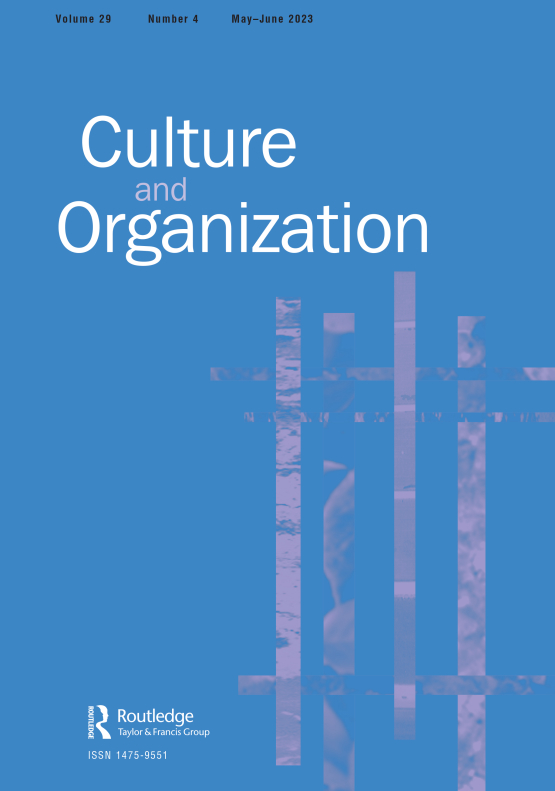Submit a Manuscript to the Journal
Culture and Organization
For a Special Issue on
Crossings
Manuscript deadline

Special Issue Editor(s)
Alexia Panayiotou,
University of Cyprus
alexiap@ucy.ac.cy
George Kokkinides,
Cyprus University of Technology
georgios.kokkinidis@cut.ac.cy
Christiana Tsaousi,
Cyprus University of Technology
christiana.tsaousi@cut.ac.cy
Marco Checchi,
Northumbria University
marco.checchi@northumbria.ac.uk
Crossings
This special issue is closely linked to the SCOS Conference in Nicosia (6-9 July 2025), so authors of papers presented at the Conference are encouraged to submit their work to this Special Issue, although it is not a requirement for consideration for the Issue.
Details for the call are found below.
Submission Instructions
Drawing inspiration from the SCOS2025 conference held in Nicosia, Cyprus, with the theme of ‘Crossings,’ the Special Issue seeks to engage with what ‘crossing’ and ‘crossings’ mean, especially in a world that seems increasingly polarized and divided. Submissions are encouraged to explore acts of ‘crossing’, ‘transversing’, and ‘reaching across’, but also how we define the notion of ‘boundaries’ both symbolically and in practice. Crossing and boundaries may be physical, mental, emotional, social, cultural (Duarte & Hodge, 2007), geographical (Rottenburg, 2007; Muhr 2012), organizational, disciplinary, visual, identity-based or other. Boundaries may be solid or fluid (Kreiner & Schultz, 1995), visible or invisible, obvious or hidden, externally or internally imposed, socially or emotionally constructed (Prasad, 2014), sometimes hostile and sometimes needed or even wanted. As a result, crossings and boundaries may be fundamental to organisation and organizing.
What does it mean then to reach across these boundaries? Can studies of organisations and related scholarly work, seen as an embodied and sometimes political activity, help us make sense of this act? Can we theorize the permeability and porosity of boundaries and the effect of crossings on them? Is scholarly work also, in itself, an act of crossing?
Most importantly, how can we form connections both in spite of but also emerging from these crossings? Is it possible to revitalize academia, bringing hope (Kostera, 2024) and ‘goodness’ (Connell, 2022) back to the university and especially to the epicentre of the business school classroom (Rhodes and Pullen, 2023)? For the Special Issue, we also welcome papers that work with concepts of fluidity to explore how sometimes what seems to separate is also what connects. Can the past and the roots of management/organization studies help us accomplish future crossings? Can we seek new routes in how we ‘do academia’ but also business and management?
The call for papers seeks to gather a multiplicity of approaches and disciplinary foci. We welcome contributions from a range of theoretical and qualitative methodological perspectives and will also pay attention to diversity in authorship, so as to include authors from different geographical locations, career stages and demographics.
Potential lines of enquiry may include:
● What does crossings and boundaries entail?
● What do geo-political boundaries, borders and crossings—or the infeasibility or danger of such crossings— involve? How do they form and/or disrupt communities? And, how do we relate to these boundaries and crossings?
● How are boundaries defined? When do boundaries become borders? How are boundaries demarcated, constructed, maintained, reconfigured, dissolved? With what consequences, for whom?
● In an age of unprecedented human mobility, what role does ‘power’ as an analytical concept have in helping us make sense of boundaries and crossings?
● Can fluidity allow us to explore how sometimes what seems to separate is also what connects? How do we form and forge connections amidst/due to/ in spite of crossings?
● How do we make sense of symbolic boundaries and crossings? How do literal and symbolic boundaries and crossings inform each other?
● What does the ‘in between’ of crossings look like?
● How do we make sense of boundaries and crossings in nature? And what are the ecological implications of these?
● How do crossings entrench/challenge/redefine identities?
● What are the boundaries of our bodies? What affects, emotions and responses do crossings and boundaries produce?
● (How) can we reimagine spatial and temporal boundaries wherever, whenever and in whatever form they exist (in states, organizations, pasts/presents/futures)? When do crossings become liminal spaces of/for transformation? What role do we as scholars have in this?
● How do we bring care and vulnerability into our discussions of crossings and the potential of crossings for inclusivity?
This special issue is closely linked to the SCOS Conference in Nicosia (6-9 July 2025), so authors of papers presented at the Conference are encouraged to submit their work to this Special Issue, although it is not a requirement for consideration for the Issue.
Please submit the special issue title when submitting your paper to ScholarOne.
The window for submissions of full manuscripts is August 31, 2025 – December 31, 2025.
All style and word limit requirements should follow the guidelines noted for Culture and Organization.
We anticipate a publication date for the SI in May 2027.
Please email any comments or queries to any one of the Special Issue Editors.
References
Connell, Raewyn (2022). The Good University: What Universities Actually Do and Why it’s Time for Radical Change. London: Bloomsbury Academic.
Duarte, Fernanda and Hodge, Bob (2007). Crossing Paradigms: A Meta‐Autoethnography of a Fieldwork Trip to Brazil, Culture and Organization, 13(3): 191-203.
Muhr, Sara Louise (2012). Strangers in Familiar Places – Using Generic Spaces in Cross-Cultural Identity Work, Culture and Organization, 18(1): 51-68.
Kostera, Monika (2024). The University of Hope. Oxford, UK: Oxford University Press.
Kreiner, Kristian and Schultz, Majken (1995). Soft cultures: The Symbolism of Cross-Border Organizing, Culture and Organization, 1(1): 63-81.
Prasad, Ajnesh (2014). You Can’t Go Home Again: And Other Psychoanalytic Lessons from Crossing a Neo-Colonial Border, Human Relations, 67(2): 233-257.
Rhodes, Carl and Pullen, Alison (2023). The Good Business School. Organization, 30(6): 1273-1280.
Rottenburg, Richard (2007). Sitting in a bar 1. Culture and Organization, 6(1): 87-100.

